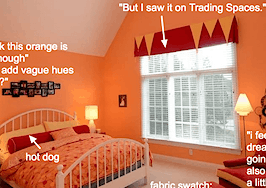- Case could have implications for what happens to listing photos after a property sells, and who has rights to them.
Real estate listing photos appear to be the subject of increasing legal skirmishes lately, and there are at least two players in the industry not ready to give up the fight for their rights to them.
Real estate giant Zillow Group and real estate photography firm VHT are both petitioning the 9th U.S. Circuit Court of Appeals to overturn a lower, district court’s final judgment on a two-year legal battle between the two companies. VHT alleged that Zillow Group had been stealing tens of thousands of VHT’s photos and illegally using them for its own profit and gain.
The final judgment, issued July 10 by Judge James L. Robart of the U.S. District Court in the Western District of Washington in Seattle, upheld a $4.05 million verdict against Zillow Group, cut down from a previous $8.3 million verdict.
Robart found that VHT failed to present sufficient evidence that Zillow directly infringed on 24,202 of VHT’s photos, but found that Zillow Group willfully infringed on 2,700 of VHT’s photos, possibly for its own financial benefit.
Now it seems neither Zillow Group nor VHT were satisfied with this ruling. Both companies filed notices of appeal less than 10 days into the 30-day deadline after the final judgment.
“We have persistently maintained our belief that this suit was without merit. While we are pleased that the court largely supported our position, we filed notice yesterday that we intend to appeal a portion of the lower court rulings,” Zillow Group said in an emailed statement.
“We take copyright protection and enforcement seriously and will continue to respect copyright permissions across our platforms.”
The real estate industry has been following the VHT lawsuit closely, in part because the photos at issue in the case were provided to Zillow by real estate agents, brokers and multiple listing services (MLSs) — possibly under misattributed rights. The case highlights how real estate agents and brokers may want to keep track of what happens to the photos they send to Zillow and other listing sites, and the terms under which they are sent.
VHT did not name any agents, brokers or MLSs as defendants in the case, but purporting to license photos under rights they don’t have could land real estate pros in legal hot water in the future.
Rights to property photos — essential marketing tools for agents wishing to sell homes — have been the target of heightened scrutiny in recent years as the photos increasingly appear on multiple websites and their value beyond selling a specific home becomes apparent.
Legal errors?
Neither of the companies have yet filed appellate briefs explaining their reasoning behind the appeals. A litigant who files an appeal must show that the trial court made a legal error that affected the decision in the case, according to the Administrative Office of the U.S. Courts.
Zillow Group declined to comment on what legal errors the company believes the district court made. One exhibit that the company filed with its notice of appeal hints at part of the company’s reasoning, however.
The exhibit is a partial transcript of proceedings before Judge Robart in which he considers how to assess statutory damages in the case. According to copyright law, plaintiffs who prove infringement may be entitled to between $750 and $30,000 per work and those who show willful infringement may be entitled to up to $150,000 per work.
Zillow Group had argued that VHT’s photo database is a compilation and, therefore, only one “work” for the purpose of assessing statutory damages. But Robart ruled that “VHT is entitled to statutory damages for each unit image that it proves has an independent economic value.” He acknowledged that federal circuit courts “are divided” on the issue when making his decision.

Brian Balduf
VHT CEO Brain Balduf did not respond to requests for comment for this story but told Inman when the final judgment came down last week that the company intended to not only appeal parts of the district court’s final judgment but also an earlier decision on tens of thousands of photographs being used by Zillow long after a property is sold.
“We’ve heard from many parties regarding consumer privacy concerns when a company continues to use photographs like Zillow has long after an agent’s relationship with that property has ended,” Balduf said.
“We have joined the Digital Media Licensing Association and are working with the DMLA to create more awareness of these types of issues and to protect agents, photographers and brokers.”
Balduf also continued to encourage real estate organizations that have feed agreements with Zillow to review them in regards to whether they are “evergreen” or “deciduous.”
In legal filings, Zillow calls feed agreements that require Zillow to take down listing data, including photographs, when a listing sells or otherwise goes off-market “deciduous.” Feeds that are “evergreen” are those under which Zillow says it has the right to continuing using and displaying data and photographs after a property sells or a listing goes off-market.
“Is there any benefit, or risk to you when a third party continues using listing data for other purposes. Data which you provided on behalf of your client, under a contract with that client that has ended,” Balduf said.
Next steps
Zillow Group has until October 26 to file its brief with the Ninth Circuit and VHT has until November 27 to submit its own brief, according to a court order posted today.
Regardless of which side wins out, these appeals promise to prolong any final decision in this suit. It takes approximately 12 to 20 months from the notice of appeal date until oral argument in a case, according to the Ninth Circuit’s website.
After oral argument, most cases are decided within three months to a year, though the court has no time limit.





